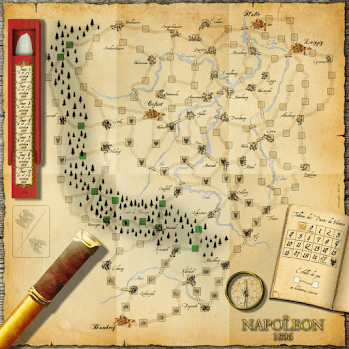Monday night, T came by and we introduced ourselves to Napoleon 1806 (Shakos). I had set the game up once before and played through a couple of turns, basic movement and combat, and to get a feel for how the cards work, but I didn't feel comfortable enough to explain the entire game to someone else, so we stuck to the quick-start rules. The game ran surprisingly smoothly. T picked up the mechanics quickly; it's not that the game is particularly difficult, but it does represent a bit of a departure for both of us. more on that later.
Using the quick-start rules, we played through the full seven turns, only making a couple of slips and noticing early enough to correct any wrong steps. The results were inconclusive; after some dancing across the countryside, the French (T) had managed to take Erfurt by the fifth turn and push the points marker down to five or six (pendulum score track, with sudden death victory of the French at 0 points, or the Prussians at 20). A strong attack on Leipzig in the sixth turn by the combined forces of Soult and Ney were barely rebuffed by Brunswick and Tauentzien, with the heavier damage going to the French, raising the points marker from its lowest ebb. If there had been two or three turns remaining, we were both confident Leipzig would fall and possibly Halle as well, but such was not to be this time. The result was a qualified victory for the Prussians (7 points).
Considering the game
Mechanically, the game is quite straight-forward. The rules (even in their English translation) read clearly and are presented with good illustrative examples. However simple the rules, though, the game is a study in Even playing with the reduced quick-start rules, there are difficult decisions at every turn for both sides. While the French possess a clear advantage in strength, they are shackled with both time (limited number of turns) and movement constraints. After a single play, we've barely begun to scratch the surface of this system. I'm looking forward to incorporating the full "Rules for the Conscript", though we'll probably play one more quick-start game to get more comfortable with the basics. I think we ay even get a decisive win from the next game, one way or another.
Technical notes
Game board: representation of area of Prussia historically hosting Napoleon's Prussian campaign (mounted)
Movement: point-to-point (hidden values in Rules for the Conscript)
Units: Divisions; represented by blocks depicting the generals commanding each unit (Soult, Lannes, Brunswick, Blucher, etc.)
Activation (quick-start rules): At the start of each turn, the French player choses a unit or stack to activate and draws a card to see how many points they have to spend on that activation. When this action (movement, combat of movement and combat) is completed, the Prussian player does the same. Activations go back and forth in this manner until both players have declared that they "pass". Then the turn marked is moved to the next turn, any non-activated units may clear any accrued exhaustion, and previously activated units are returned to their pre-activated state.
Objective: gain points enough to shift the marker to 0 (French) or 20 (Prussians) for a sudden death victory. Anything other than a 0 score at the end of turn 7 is considered a qualified victory for the Prussians.







No comments:
Post a Comment